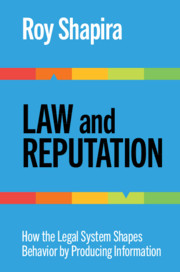Book contents
6 - Regulators’ Reputation
from Part II - Applications
Published online by Cambridge University Press: 23 August 2020
Summary
Can judicial review effectively check regulators’ behaviors? The answer largely depends on how regulators behave – what motivates them. If, as in traditional economic theory, regulators mostly maximize their narrow self-interest, then there is little that judicial review can do to stop regulatory capture. Judges may invalidate specific regulatory decisions after the fact, but they cannot overcome the inherent advantages that special interests enjoy in the way of offering lucrative future business opportunities or campaign financing. If, however, regulators care not just about material incentives, but also about their reputation, then judicial review can shape regulators’ behavior indirectly, by providing information on how regulators behave. Regardless of whether courts intervene and strike down specific regulatory decisions or not, the process of litigation can generate reputational pressures that propel the regulators to change their behavior.
Keywords
- Type
- Chapter
- Information
- Law and ReputationHow the Legal System Shapes Behavior by Producing Information, pp. 155 - 186Publisher: Cambridge University PressPrint publication year: 2020



